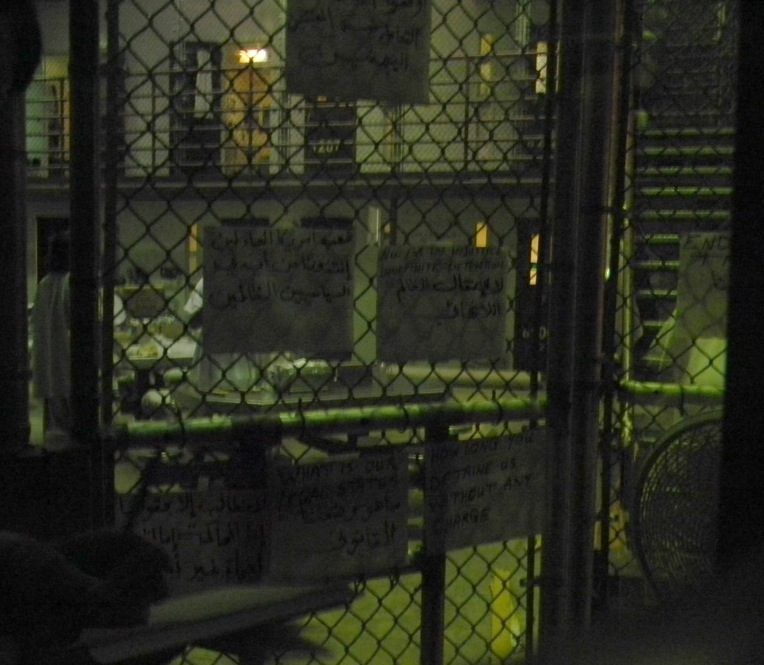WASHINGTON – A Baltimore man who has been detained in a military prison in Guantanamo Bay, Cuba, for nearly 9 years, faces trial before the Office of Military Commissions after terrorism charges were filed against him this week, according to the Defense Department.
Majid Shoukat Khan, a Pakistani national who is a legal resident of the U.S., was officially charged on Feb. 13 with conspiracy, murder, attempted murder, providing material support for terrorism and spying, according to a release from the DOD.
Late Wednesday, DOD announced that Khan’s charges were referred to a military commission for trial. He is to be arraigned within 30 days.
Khan has been detained at Naval Station Guantanamo Bay without formal charges or an end date to his incarceration since 2006, after he was imprisoned by Pakistani authorities in 2003.

The DOD statement alleges that Khan conspired to assassinate Pakistani President Pervez Musharraf with Khalid Sheikh Mohammed, a member of al-Qaeda who confessed in 2008 to his role in the planning the Sept. 11, 2001, terrorist attacks. Khan is accused of conspiring with Mohammed on other occasions relating to attacks against the U.S., including purchasing a laptop and obtaining materials about the U.S. military with the intent to give to al-Qaeda.
The charges also state that Khan aided the terrorist group Jemaah Islamiyah by delivering $50,000 for a bomb that killed 11 people at a J.W. Marriott Hotel in Jakarta, Indonesia, in 2003. He is also charged with using fraudulently obtained travel documents to travel to Pakistan in 2002, as well as traveling with his wife to Bangkok to evade authorities at the direction of Mohammed and Ali Abdul al-Aziz Ali, another Sept. 11 mastermind.
Khan is being represented by Wells Dixon and Katya Jestin from the Center for Constitutional Rights in New York. The center has filed a habeas corpus petition for Khan with the U.S. District Court for the District of Columbia requesting the lawful basis for his detention in 2006. The case is pending in D.C. District Court, Dixon said.
Dixon and the center argued in the habeas corpus case that it is unconstitutional to hold Khan “without basis, without charge, without access to counsel, and without being afforded any fair process by which he might challenge his detention,” the petition said.
The petition also argued that Khan is not and has never been an “enemy combatant.”

Chief Prosecutor Mark Martins forwarded the charges with a recommendation that Khan be tried by a military commission, but no death penalty referral was attached. That means that the highest possible punishment Khan would face is life imprisonment, the DOD release said.
Convening Authority Bruce MacDonald will appoint jurors from the commission panel and the Military Commissions Trial Judiciary would detail a military judge to the case.
The trial may be made available for public viewing at Fort Meade pending the approval of officials, said DOD spokesman Lt. Col. Todd Breasseale.
Capital News Service traveled to Naval Station Guantanamo Bay in 2011 to observe a military trial, similar to the one Khan might face, as well as to observe the strict conditions prisoners live in.
According to the DOD release, Khan lived in the U.S. from 1996 to 2002. As previously reported by Capital News Service, Khan is a 1999 graduate of Owings Mills High School and has family in the Baltimore area. When he returned to Pakistan to visit his wife, Rabia Khan, in 2003, he was “hooded, bound, and imprisoned by Pakistani authorities.” At this point he began his indefinite detainment.
In 2006, Khan was identified by President George W. Bush as a “high-value detainee” and was then sent to Guantanamo Bay without charges.
Guantanamo Bay Naval Station has been a subject of controversy since President Obama said that the facility would be closed two years ago. No actions to close the facility have yet been made.


You must be logged in to post a comment.